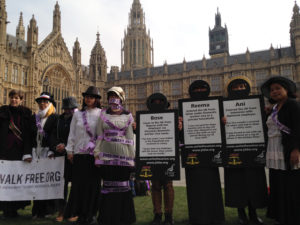Disclaimer: This article is more than 8 years old, and may not include the most up-to-date information or statistics. Please verify information with more recent sources as needed, and if you have any questions contact our Press Office.
15 June 2015
By Dr Aidan McQuade, Director

Today, I was attending the official commemoration of the signing of Magna Carta at Runnymede. Queen Elizabeth was present at the place where 800 years ago her predecessor King John put his signature to the Great Charter, which was, in truth, a political settlement to end the rebellion of the English barons. Yet the event was entitled “Foundation of Liberty” and I have been reflecting on how true that description of Magna Carta is.
There are many distinguished legal and historical scholars who argue that because it was a political settlement amongst the elite that Magna Carta is not a true exemplar of human rights, which emphasise the fundamental nature of those rights and their universality to all human beings. Those present at Runnymede were concerned about themselves and their rights not those of poor people, women or foreigners.
But that is not so unusual. Throughout history we have seen different communities struggle for rights that have been denied them. Sometimes they have understood this as part of a broader struggle – the Northern Ireland Civil Rights Association was prompted into being by the efforts of Martin King and his comrades to obtain basic civil rights for all American citizens. Other times the struggle for rights have been much more specifically focussed: I doubt that Spartacus and Crixus had much concern for the rights of Roman civilians as they fought to escape slavery at the beginning of the first millenium. And the struggle of brick kiln workers in contemporary Punjab to end their enslavement is no less vital a human rights struggle even if those workers have never heard of Spartacus, or Fredrick Douglass, or Equiano, or SOS Esclaves.
I think, if we look at it properly, we can see that all these struggles fit into the process famously described by Bobby Kennedy as “numberless diverse acts of courage and belief” that shape the history of the times. Viewed this way Magna Carta is an important, albeit, imperfect milestone along the way.
And the English barons, for their own selfish reasons perhaps, had a more profound impact than they could ever have possibly imagined.
When the case of James Somerset, and enslaved African, came before Lord Mansfield in 1772, one of Somerset’s supporters, Granville Sharp, argued that Magna Carta prohibited slavery. Mansfield ruled that there was no basis for slavery in the common law of England and Wales, common law that was underpinned by Magna Carta. Any person in slavery in that jurisdiction must therefore be free. In establishing the rights for some, the English barons inadvertently established the rights for more.
So an initial English and Welsh contribution to the history of human rights can be traced to Magna Carta, but it does not end there. It is worth remembering that the 800th anniversary of Magna Carta coincides with the 70th anniversary of the end of the Second World War. From the carnage and genocide of that war, and from the injustices and betrayals of that peace, two good things emerged.
First was the recognition that states and states’ leaders can be held to account for transgressions of international law, including war crimes and crimes against humanity. Second, the Universal Declaration of Human Rights, which was conscious repudiation by Eleanor Roosevelt, Rene Cassin and the other drafters of the Declaration, of everything the Axis stood for. Both of these things were only made possible by the blood shed by the peoples of the democracies, not least the United Kingdom.
I suppose like anyone who knows anything about Churchill I have very mixed feelings towards him. He was an imperialist and a racist and must bear considerable culpability for the atrocious wartime famine in India which killed millions. But he also must be respected for the extraordinary moral courage he showed in leading Britain in continued resistance against the Axis after the fall of France. Without that those principles of rule of international law and universality of human rights might never have been established.
I suspect also that Churchill’s advocacy of a Council of Europe, which ultimately translated the Universal Declaration into the European Convention on Human Rights administered by the European Court of Human Rights, drew on his understanding of the principles of rule of law that originated from that English and Welsh tradition that goes back to Magna Carta: Without courts to administer the law then even the grandest of charters remain just words on a piece of paper. We see that in, for example, India today where decent law against bonded labour remains ineffectual because there is insufficient court capacity to ensure that it is properly implemented. Likewise without the international accountability that international courts provide countries can with impunity choose to trample over the rights of ordinary people.
So it is deeply disappointing that 800 years after the signing of Magna Carta and 70 years after the end of the Second World War that the UK government is talking about scrapping the Human Rights Act and pulling out of the European Court of Human Rights. If this country is not to be bound by the most basic principles of human rights, rights that were bloodily won with the lives of young British people on the battlefields of the Second World War, then why should a country like Niger, for example, allow itself to be held internationally legally accountable? Yet in 2008 Niger did just that in a case Anti-Slavery International helped to bring, The West African Regional Court found Niger guilty of failing to protect its citizens from slavery, a judgement Niger accepted and which led to the liberation of thousands of people in slavery across the region.
Again and again in the contemporary world we see governments legislate and regulate in ways that either directly cause the enslavement of others or facilitate private individuals to do the enslaving without any fear of sanction.
Amongst the most notorious examples of this is the “kafala” system of the Gulf states. This is a system that requires that overseas workers, for example those imported to build the infrastructure and venues for Qatar’s 2022 World Cup, are “sponsored” by an employer. The nature of this “sponsorship” includes the power to deny employees the right to change employer or even leave the country irrespective of how dangerous their working conditions or abusive the employment relationship. It is in fact a system that facilitates the enslavement and manslaughter of thousands of vulnerable workers.
Countries like Qatar must also be held accountable in international law. While it will be a long and difficult road until that is achieved one thing we can be certain of is this: it will not be advanced one iota by the United Kingdom betraying its own history by declaring that it is above the very advances in human rights and international rule of law that it helped to enact.
But perhaps there is some self-interest in this government’s position. Let us consider for a moment domestic work: it is sometime described as an unskilled occupation. However it is an occupation for which there is considerable demand in the UK, a demand which cannot be met without overseas domestic workers. And if this demand were met with workers paid a living wage the value the UK Exchequer would run into millions.
However this does not chime with the prevailing prejudices in some parts of the UK so the government felt it was in need of showing it was being tough on immigration. It introduced a restriction on visas for overseas domestic workers in 2012. This means that Overseas Domestic Workers are no longer allowed to change employers, irrespective of how abusive those employers are. If they do leave they are threatened with deportation. This is an enormous power to put into the hands of unscrupulous employers. In fact it is the UK’s own kafala system. Those who monitor the situation, such as the charity Kalayaan, have found increases in the numbers of cases of slavery of overseas domestic workers.
Lord Mansfield ruled in the Somerset case that slavery could only be made legal in the UK as a result of statute. This government has however managed to de facto legalise slavery in the UK by the use of mere regulation.
So I don’t think, in spite of everything, that calling the Magna Carta the foundation of liberty is mere hyperbole. It is however tragic that the government of the United Kingdom seems intent on repudiating such a considerable part of the United Kingdom’s human rights tradition that has grown up in the 800 years since the barons met at Runnymede, and the 70 years since British forces liberated Bergen-Belsen.





